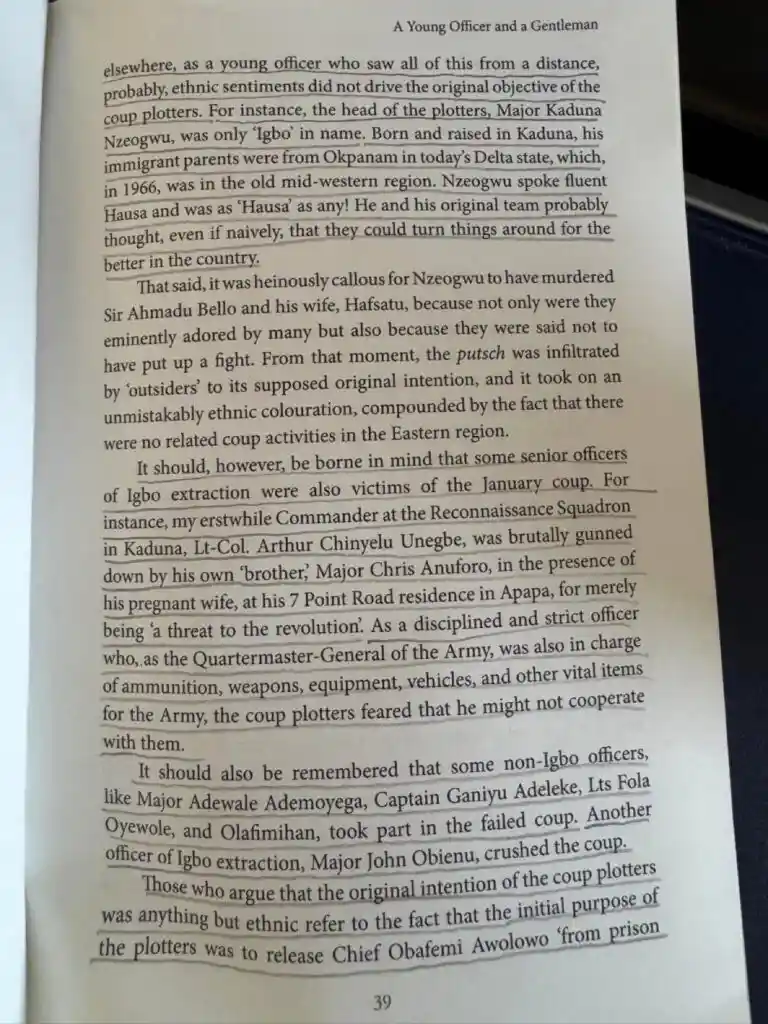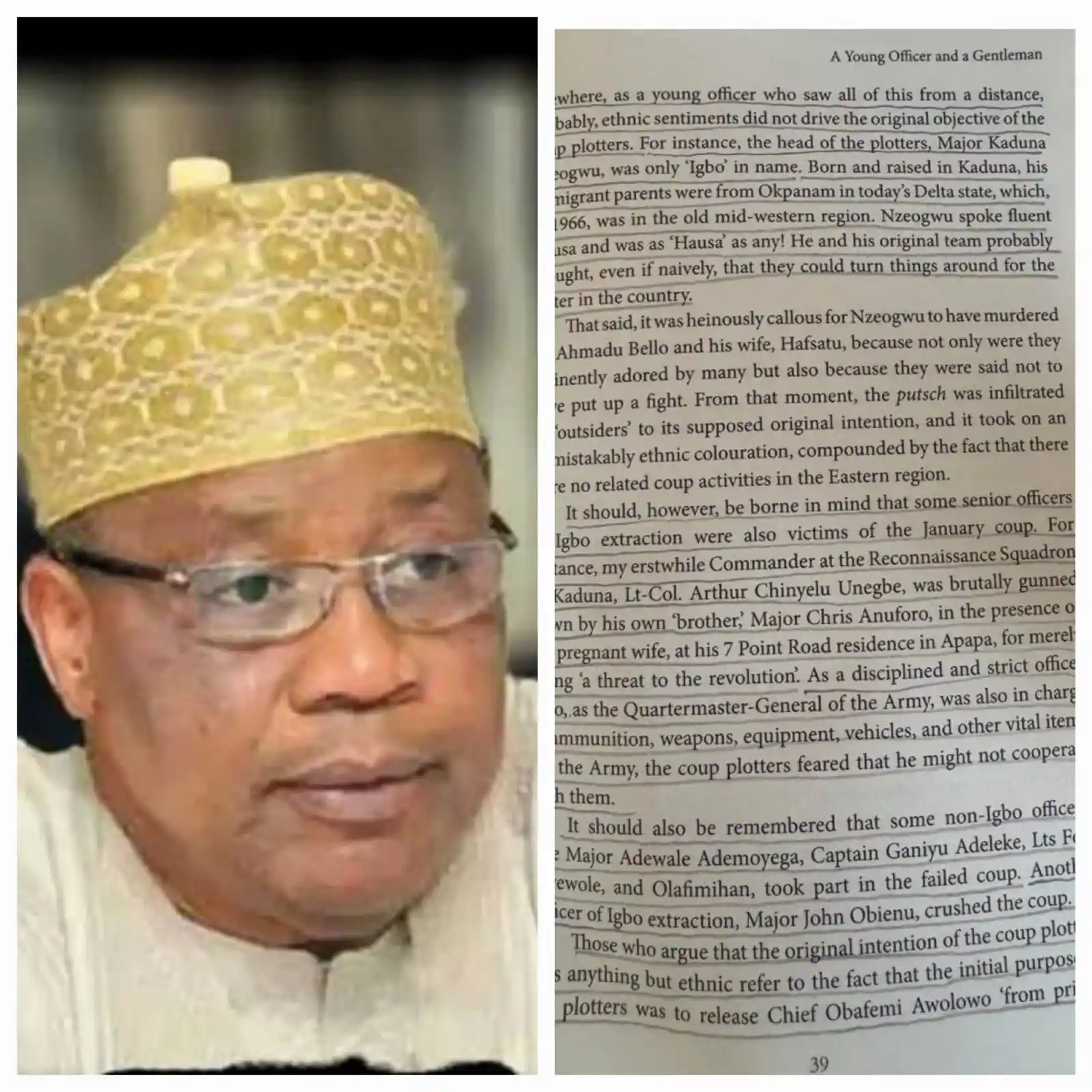1966 Coup Not an ‘Igbo Coup’ – IBB’s New Book Highlights Nigeria’s Injustice Against Igbos
- Advertisement -
In a major historical reassessment, former Nigerian military leader General Ibrahim Badamasi Babangida (IBB) has debunked the long-standing claim that the 1966 military coup was an “Igbo Coup.” His revelations, published in his newly released book, challenge the ethnic characterization of Nigeria’s first coup and call for a more nuanced understanding of the event.
For decades, the January 15, 1966 coup has been widely labeled as a plot by Igbo military officers to dominate Nigeria’s leadership. This controversial narrative has fueled ethnic tensions, contributing to the Nigerian Civil War (1967–1970) and the continued marginalization of the Igbo people in national politics.
Babangida’s historical reevaluation presents a different picture, arguing that the coup was not ethnically motivated but rather the result of deep political and military frustrations during Nigeria’s First Republic.
- Advertisement -
This book has reignited discussions about Nigeria’s past, the lingering effects of the coup, and the structural injustices faced by the Igbo people.
Babangida’s Perspective on the 1966 Coup
1. The Coup Was Not an Igbo Conspiracy
- Advertisement -
IBB’s book directly refutes the claim that the 1966 coup was designed to advance Igbo political dominance. Instead, he argues that:
- The coup was led by military officers from multiple ethnic backgrounds, although many were Igbo.
- Its motivation was the widespread corruption, nepotism, and political instability of Nigeria’s First Republic.
- It was not a tribal coup, but an attempt to reform Nigeria’s failing governance.
Historical records support this view, as the coup’s leader, Major Chukwuma Kaduna Nzeogwu, was himself a Midwesterner who criticized corrupt politicians across all ethnic groups.
- Advertisement -
Also Read : Court Clears IPOB Leader of Terrorism Charges, Awards ₦5 Million in Damages Against FG
2. Ethnic Narratives Fueled Mistrust and Division
Babangida explains that the mischaracterization of the coup as an “Igbo Coup” deepened Nigeria’s ethnic divides, leading to:
- Pogroms against Igbos in Northern Nigeria (1966), which resulted in thousands of deaths and mass displacement.
- The Biafran War (1967–1970), which claimed over one million lives and left lasting scars on the Igbo population.
- The systemic exclusion of Igbos from key political and economic opportunities in post-war Nigeria.
3. The Impact on Igbo Political Marginalization
- Advertisement -
Perhaps Babangida’s most striking argument is that the false narrative of an “Igbo Coup” has contributed to the continued exclusion of Igbos from Nigeria’s highest political offices.

Despite their significant contributions to Nigeria’s economy, culture, and leadership, no Igbo individual has been elected as President of Nigeria in the country’s democratic history.
Babangida points to this as a deliberate political imbalance, arguing that:
- No single ethnic group should be punished indefinitely for historical events.
- Reconciliation and inclusivity are necessary for national unity.
- Nigeria must address the barriers preventing Igbos from attaining the presidency.
Historical Context: The Aftermath of the 1966 Coup
The Pogroms and the Biafran War
Following the coup, mass killings of Igbos in Northern Nigeria erupted. These violent attacks resulted in:
- Over 30,000 Igbos killed in the North.
- Hundreds of thousands forced to flee back to Eastern Nigeria.
- Growing calls for Igbo self-determination, culminating in the secession of Biafra.
This ultimately led to the Nigerian Civil War (1967–1970), one of the most devastating conflicts in African history. The war resulted in:
- Famine and mass starvation among the Igbo people.
- Heavy military and civilian casualties.
- Post-war policies that economically and politically disadvantaged the Igbo community.
The Igbo Struggle for Political Inclusion
Since the end of the Biafran War, Igbos have faced continuous political exclusion in Nigeria. This is reflected in:
- The failure of Nigeria’s power-sharing arrangements to include an Igbo president.
- Systemic economic policies that have limited Igbo influence in federal economic structures.
- Underrepresentation in key national security and government appointments.
Many believe these challenges stem from lingering stereotypes and fears dating back to the 1966 coup.
Public Reactions to Babangida’s Revelations
1. Praise from Igbo Intellectuals and Historians
Several Igbo scholars and historians have welcomed Babangida’s statement, seeing it as a:
- Step toward correcting historical inaccuracies.
- Recognition of the injustices faced by the Igbo people.
- Call for national reconciliation and inclusivity.
2. Mixed Reactions from Other Ethnic Groups
While some non-Igbo commentators agree that Nigeria must move past historical divisions, others have criticized IBB’s remarks, arguing that:
- The coup disproportionately benefited Igbo officers at the time.
- It indirectly led to the counter-coup in July 1966, which killed Nigeria’s first military Head of State, Major General Aguiyi-Ironsi (an Igbo officer).
- Revisiting the past may reopen old wounds rather than heal them.
3. Political Implications Ahead of Nigeria’s 2027 Elections
Babangida’s statements come at a time when Nigeria is approaching another election cycle, raising important political questions:
- Will Nigeria finally elect an Igbo president?
- Will Babangida’s book influence political realignments?
- Could this spark renewed agitation for Igbo self-determination?
A Call for National Reflection and Reconciliation
Babangida’s book challenges Nigerians to confront their history with honesty. He emphasizes that:
- Nigeria must move beyond ethnic blame-games.
- Historical narratives should be based on facts, not stereotypes.
- All ethnic groups must work together for a more inclusive Nigeria.
The lessons of the 1966 coup and its aftermath are clear: misrepresentation of history can fuel divisions, while acknowledging the truth can lead to healing.
As Nigeria continues its democratic journey, Babangida’s book serves as a reminder of the importance of justice, equity, and national unity.
Final Thought: A Shift in Nigeria’s Historical Narrative?
With a former Head of State now openly challenging long-held assumptions, this book may mark the beginning of a broader national conversation about Nigeria’s history and future.
Whether Nigeria will act on these lessons remains to be seen. However, one thing is clear: the Igbo struggle for political fairness and national integration is far from over.
What are your thoughts on Babangida’s revelations? Should Nigeria rethink its approach to Igbo political inclusion? Let’s discuss.
- Advertisement -


